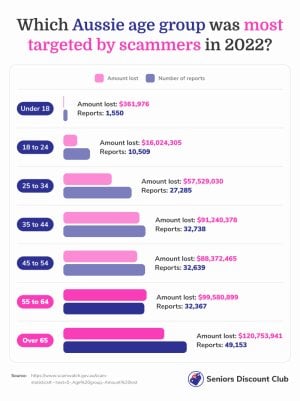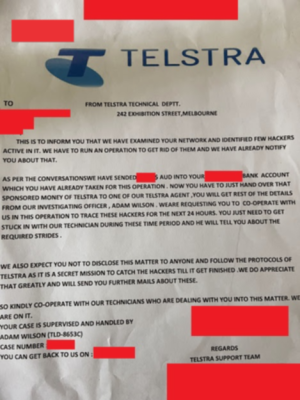Scam Watch issues urgent warning about a new Telstra scam message that could end up in YOUR mailbox
- Replies 30
Scams have been an unwelcome fixture of our daily lives, with it not being uncommon to receive a sketchy text or email as often as every week. But how about a letter?
If you’re a Telstra customer, then we have some bad news for you: you’re the latest target of a unique scam.
This week, the Australian Competition and Consumer Commission (ACCC) warned that customers of the telecommunications giant need to be on alert for a letter that could end up costing them dearly.
Scamwatch, the ACCC’s arm for keeping track of scams, released a photo of the type of letter being sent out by scammers, and the letter contains Telstra's logo.
'Beware, scammers are using letters like this to convince people to withdraw money and hand it over in person to someone that will collect it from their home,' Scamwatch said.
'This is a scam. Warn your friends, family, and neighbours.'
The letter, all in capital letters and laden with grammatical errors throughout, claims to be from the 'Telstra Technical Department' in Melbourne, and says that the recipient’s network has allegedly been hacked.
The sender, allegedly Adam Wilson, frames the message as confidential by indicating that the recipient is part of a Telstra effort to catch hackers ‘detected’ in the recipient’s network.
The recipient is then urged to hand over a certain amount of money to a so-called ‘Telstra agent’ to 'catch the hackers' before the 24-hour window closes.
It is unclear whether or not the scheme has managed to trick people into shelling out their money.
Some people shared their reactions to ScamWatch’s warning, and they took aim at the letter’s attempt at convincing Telstra customers of its legitimacy.
‘Must be important because it’s in all caps,’ one user said.
‘I can’t stop laughing at how badly it’s worded, but definitely I’ll be passing this along to the people I know,’ another added.
A third commented: ‘The level of English is worrying, but as usual, those who reject it due to its errors would be those that the scammers don’t want to deal with.’
Lastly, another user offered their take on how it would probably play out for victims.
‘This is pretty audacious,’ they said. ‘I don’t think the hacker will actually come to your home as they are almost certainly somewhere overseas.’
‘They will make some excuse for not turning up, then suggest you pay electronically instead.’

Meanwhile, a representative for Telstra said customers should watch out for red flags in scam letters.
‘Check the spelling and grammar in the communications as this will often be a dead giveaway of a scam or highlight that the communication is not from the legitimate provider,’ the spokesperson said.
‘If you feel you are being pressured on a call or in communications to share personal identification or banking or financial information, end the call and call the represented organisation on their official number.’
‘Also, let’s be frank: Telstra don’t do “secret missions”, it's not part of our ops model.’

The letter scam may be a sign that scammers are adapting to more stringent security measures put out by companies like Telstra, which reportedly had blocked around 225 million scam texts since April 2022.
Still, Australians lost a whopping $569 million to scams last year, according to ScamWatch data.
Of this, $3 million was lost to scams delivered by mail.
Meanwhile, in terms of age, the 55 and over bracket had the largest recorded scam reports and amount of losses with 81,520 incidents and $220 million lost.
Those who fall victim to any type of scam should immediately report the event to authorities and change log-in details, when applicable.
Aussies can also report scams directly to ScamWatch here.

On a related note, there’s also a McAfee scam doing the rounds which one of our dear members Hanna shared with us in the hopes others could take note.
You can also read members @Mollybristlez and @jennineavril’s eBay and parcel delivery scam warnings as well — and many others — at our Scam Watch forum.
So, what are your thoughts on this? Have you received similar scam messages by mail recently? If so, what did you do?
Tell us in the comments section below!
If you’re a Telstra customer, then we have some bad news for you: you’re the latest target of a unique scam.
This week, the Australian Competition and Consumer Commission (ACCC) warned that customers of the telecommunications giant need to be on alert for a letter that could end up costing them dearly.
Scamwatch, the ACCC’s arm for keeping track of scams, released a photo of the type of letter being sent out by scammers, and the letter contains Telstra's logo.
'Beware, scammers are using letters like this to convince people to withdraw money and hand it over in person to someone that will collect it from their home,' Scamwatch said.
'This is a scam. Warn your friends, family, and neighbours.'
The letter, all in capital letters and laden with grammatical errors throughout, claims to be from the 'Telstra Technical Department' in Melbourne, and says that the recipient’s network has allegedly been hacked.
The sender, allegedly Adam Wilson, frames the message as confidential by indicating that the recipient is part of a Telstra effort to catch hackers ‘detected’ in the recipient’s network.
The recipient is then urged to hand over a certain amount of money to a so-called ‘Telstra agent’ to 'catch the hackers' before the 24-hour window closes.
It is unclear whether or not the scheme has managed to trick people into shelling out their money.
Some people shared their reactions to ScamWatch’s warning, and they took aim at the letter’s attempt at convincing Telstra customers of its legitimacy.
‘Must be important because it’s in all caps,’ one user said.
‘I can’t stop laughing at how badly it’s worded, but definitely I’ll be passing this along to the people I know,’ another added.
A third commented: ‘The level of English is worrying, but as usual, those who reject it due to its errors would be those that the scammers don’t want to deal with.’
Lastly, another user offered their take on how it would probably play out for victims.
‘This is pretty audacious,’ they said. ‘I don’t think the hacker will actually come to your home as they are almost certainly somewhere overseas.’
‘They will make some excuse for not turning up, then suggest you pay electronically instead.’

Aussies aged 55 and over comprise the largest demographic targeted and victimised by scams for 2022. Image Credit: Pixabay/sabinevanerp
Meanwhile, a representative for Telstra said customers should watch out for red flags in scam letters.
‘Check the spelling and grammar in the communications as this will often be a dead giveaway of a scam or highlight that the communication is not from the legitimate provider,’ the spokesperson said.
‘If you feel you are being pressured on a call or in communications to share personal identification or banking or financial information, end the call and call the represented organisation on their official number.’
‘Also, let’s be frank: Telstra don’t do “secret missions”, it's not part of our ops model.’
Key Takeaways
- Telstra customers are being warned to stay on the lookout for letters sent by scammers that could end up on their mailboxes.
- The letter claims to come from the Telstra Technical Department, stating the recipient’s network has been hacked and that they would need to return money to 'Telstra'.
- Telstra has advised customers to check the spelling and grammar of the letter, as well as not share personal identification or financial information.
Still, Australians lost a whopping $569 million to scams last year, according to ScamWatch data.
Of this, $3 million was lost to scams delivered by mail.
Meanwhile, in terms of age, the 55 and over bracket had the largest recorded scam reports and amount of losses with 81,520 incidents and $220 million lost.
Those who fall victim to any type of scam should immediately report the event to authorities and change log-in details, when applicable.
Aussies can also report scams directly to ScamWatch here.

Older Aussies saw the most amount of money stolen and reported scams in 2022 according to Scam Watch data. Image Credit: Seniors Discount Club
On a related note, there’s also a McAfee scam doing the rounds which one of our dear members Hanna shared with us in the hopes others could take note.
You can also read members @Mollybristlez and @jennineavril’s eBay and parcel delivery scam warnings as well — and many others — at our Scam Watch forum.
So, what are your thoughts on this? Have you received similar scam messages by mail recently? If so, what did you do?
Tell us in the comments section below!
Last edited:








